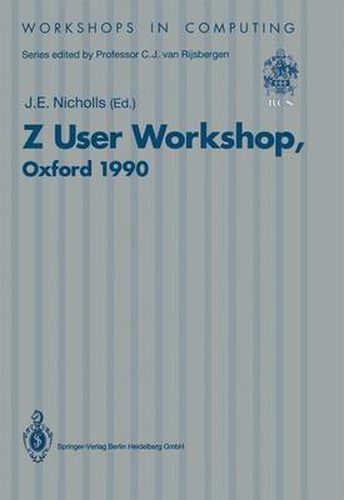Readings Newsletter
Become a Readings Member to make your shopping experience even easier.
Sign in or sign up for free!
You’re not far away from qualifying for FREE standard shipping within Australia
You’ve qualified for FREE standard shipping within Australia
The cart is loading…






This title is printed to order. This book may have been self-published. If so, we cannot guarantee the quality of the content. In the main most books will have gone through the editing process however some may not. We therefore suggest that you be aware of this before ordering this book. If in doubt check either the author or publisher’s details as we are unable to accept any returns unless they are faulty. Please contact us if you have any questions.
The approach described in [JonSl, JonS3a, JonS3b] set out to extend operation decom- position methods for sequential programs - such as are used in VDM [Jon90] - to cover concurrent shared-variable systems. The essential step in [JonSl] was to recognise that 1 inter/erence had to be specified. This is necessary in order to achieve a notion of compo- sitionality - contrast [Owi75]. Rather than the many erudite definitions of composition- ality (e. g. [ZwiSS]), the view taken here is that, when a development task is decomposed into sub-tasks, these must be simpler than the original ‘task. This is easy to achieve for sequential programs: decomposing a specified operation S into (Sl; S2), the specifica- tions of the Sj should neither include unnecessary information from each other nor from the context (i. e. S). An interesting discussion of the 'Quest for Compositionality’ (in the context of concurrency) is contained in [dRS5, dRS6]. The rely/guarantee idea provided an existence proof that specifications and developments could be made powerful enough to cope with some forms of interference. The work initially attracted little attention but 2 3 there have recently been some critiques and attempts to extend the work * Most notably, Ketil St~len’s thesis [St~90] addresses the main shortcomings of [JonSl]: the fact that no attempt had been made to handle synchronization has been remedied by adding a wait condition and other limitations of expressiveness have been shown to succumb to the judicious use of auxiliary variables.
$9.00 standard shipping within Australia
FREE standard shipping within Australia for orders over $100.00
Express & International shipping calculated at checkout
This title is printed to order. This book may have been self-published. If so, we cannot guarantee the quality of the content. In the main most books will have gone through the editing process however some may not. We therefore suggest that you be aware of this before ordering this book. If in doubt check either the author or publisher’s details as we are unable to accept any returns unless they are faulty. Please contact us if you have any questions.
The approach described in [JonSl, JonS3a, JonS3b] set out to extend operation decom- position methods for sequential programs - such as are used in VDM [Jon90] - to cover concurrent shared-variable systems. The essential step in [JonSl] was to recognise that 1 inter/erence had to be specified. This is necessary in order to achieve a notion of compo- sitionality - contrast [Owi75]. Rather than the many erudite definitions of composition- ality (e. g. [ZwiSS]), the view taken here is that, when a development task is decomposed into sub-tasks, these must be simpler than the original ‘task. This is easy to achieve for sequential programs: decomposing a specified operation S into (Sl; S2), the specifica- tions of the Sj should neither include unnecessary information from each other nor from the context (i. e. S). An interesting discussion of the 'Quest for Compositionality’ (in the context of concurrency) is contained in [dRS5, dRS6]. The rely/guarantee idea provided an existence proof that specifications and developments could be made powerful enough to cope with some forms of interference. The work initially attracted little attention but 2 3 there have recently been some critiques and attempts to extend the work * Most notably, Ketil St~len’s thesis [St~90] addresses the main shortcomings of [JonSl]: the fact that no attempt had been made to handle synchronization has been remedied by adding a wait condition and other limitations of expressiveness have been shown to succumb to the judicious use of auxiliary variables.